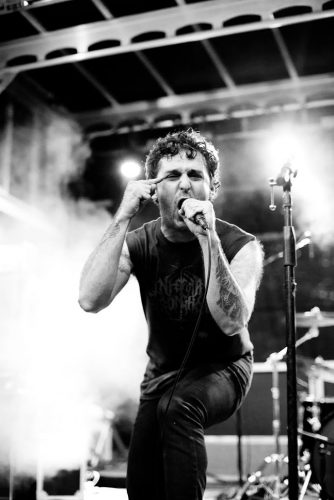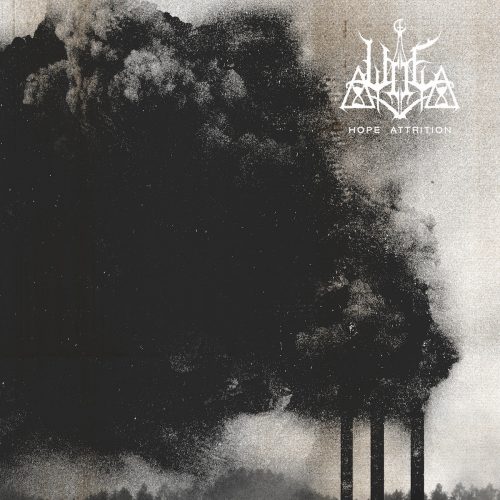(The world hasn’t ended… another Saturday rises… and with it another of Andy Synn’s WAXING LYRICAL columns… with the insights provided today by Chris Grigg of the NY black metal band Woe.)
This is the third edition of Waxing Lyrical focussing on a band I handpicked for last year’s “Critical Top Ten” which… probably says something important. Though I’m not sure what. Maybe that great albums deserve great lyrics? Something like that?
Either way, Hope Attrition was a fantastic album “…as densely packed with clever ideas, razor-sharp hooks, and raw passion, as anything I’ve heard…” and Woe are a fantastic band, which is why I harassed and harangued the band’s vocalist/guitarist Chris Grigg into telling me a little about his background, his process, and his methods.
Beginnings…
I started Woe as a solo project, so there was never an option to have someone else write lyrics. This wasn’t a problem, since I was in my early 20s and in a constant state of eagerness to share my thoughts on just about everything with pretty much anyone.
As the project grew into a full band, this is the one role that I haven’t farmed out to the team in some way.
Inspirations…
When it comes time to sit down and write lyrics, the equation is usually:
(vibe of the music + (what’s on my mind – parameters unacceptable to the project)) + (0.5 * vibe/concept of the release)
That is to say: I listen to what the song is telling me, I think about what I actually want to say and how it fits with what the song demands, I subtract those topics that are not permissible in the context of the band, and then I consider the role this song plays in the album as a whole but with less weight than the other variables. This usually leaves me with a good starting point.
By the time I start writing lyrics, I’ve usually recorded at least one instrumental demo of the song and have rough rhythm ideas, so I’ll work from that framework. Something I’ve found very helpful has been listing words and phrases, organized by syllable, that relate to the topic and have the correct energy for the song. I mostly use these as placeholders when I’m feeling blocked and go back to clean them up later, but sometimes they just work. If nothing else, it’s an exercise in finding the correct mental headspace for the song.

Photo by Charles Nickles for CVLT Nation
Influences…
Where Metal is concerned, I’m more of a “rhythm-and-delivery” guy than a “smart lyrics” guy, so I tend to be more than a little willing to overlook some dopey lyrics if I can appreciate the energy of the material.
It upsets some of my bandmates whenever I say this, but my favorite metal vocalist and lyricist is Dani Filth. You’ll find few vocalists who use their voice more effectively than Dani on the classic (yes, classic) Cradle of Filth albums. Every song on Cruelty and the Beast is a masterpiece but take this:
Scar-riddled saffron eves bleed like the conjugal.
Vestal daughters giving throat to the priest.
A psychophant, the despoiler of faith,
now his skinless crucifixion feeds a winged diocese.
(“Lustmord and Wargasm (The Lick of Carnivorous Winds)”)
The way it shrieks alongside that “oh-shit-they’re-going-for-it” d-beat gives me chills every single time, but the lyrics stand out not just because of the phantasmagoric word salad but also their completely unnecessary detail. Let’s be honest: a CoF album could just be Dani sounding scary while reading his grocery list and it would be the same to most listeners. Instead, he gave us something deliberately, almost torturously, crafted.
As a fan, I think it’s an enjoyable easter egg and, as an artist, it inspires me to work harder, even when I think nobody’s going to be looking, because excellence for its own sake is worth pursuing.
While Dani’s lyrics push me to be a more dramatic, unfettered writer, I actually take more frequent inspiration from other kinds of music. I’m particularly inspired by the kind of context switching you find in a lot of Rap, the rapid-fire shifting from aggressive to vulnerable, sometimes subtle, other times brutally direct, within the same song or even the same line.
We killin’ them for freedom cause they tortured us for boredom
And even if some good ones die, fuck it, the Lord’ll sort ’em
(Run the Jewels, “Close Your Eyes (And Count to Fuck)”)
I wrote some raps that made sure that my lifeline reekin’
The scent of a reaper, ensurin’ that my allegiance
With the other side may come soon, and if I’m doomed
May the womb of my mother be blessed for many moons
(Kendrick Lamar, “Sing About Me”)
There’s an intimate urgency to this kind of delivery that you don’t find in the grandiose intensity of extreme metal. A similar driving pulse of expression is constant in the work of Propagandhi.
I see it’s burning you inside
Like some exploding sun
Your mind constantly returns
To a place that’s not so fucking cold
But on fire with war
(Propagandhi, “Night Letters”)

Roadburn, photo by Niels Vinck
Changes…
I have a constant awareness that my songs are written to be performed. If a line feels weak when I’m writing and recording, it’s going to be a chore to bark out night after night. When a line is particularly juicy, my performance is always better, and the song benefits from it. The result is that I spend more time looking at every every word, every line.
But to temper my eagerness to invoke my inner Dani Filth, I think about something else. There’s a long article on Complex about Kanye West recording My Beautiful Dark Twisted Fantasy in which Nicki Minaj is interviewed. She remarks,
“I remember a conversation I had with Kanye every time I sit down to write now. Every single time I sit down, I remember him asking, ‘What is it that you wanna say? It’s not about rhyming words, it’s about what you really wanna say.’ “
The intended message of any given song was always on my mind, but now, I think more carefully about whether my point is going to come across the way I want it to.
Something old…
One of my favorite old Woe songs is “Condemned as Prey.”
I wrote it 11 years ago, when I was just 23. I had been pushing that album in a more serious, introspective direction, writing a lot of sad, angry songs about the impermanence and untrustworthiness of things we accept as “truth,” but this one demanded a different kind of darkness. It was intended to be my take on something off of Ulver‘s Nattens Madrigal, so I wanted to do something that was both Woe-appropriate but still had that Ulver feel.
My favorite lines are:
She is the creeping shadow cast by every winter’s moon
Frigid darkness to chill the fragile skin of man
Condemned as prey to her unyielding hunger
If you listen to the recording, you can hear the way I really bite into the words. I enjoy the idea of “the fragile skin of man,” a reminder of our shared vulnerability. It was what the song demanded, and I’m glad it’s stuck with the band over the years.
Something new…
“Drown Us With Greatness” from our 2017 album Hope Attrition is probably one of the best songs I’ve written. It really demonstrates the best of the process/perspective changes I outlined earlier.
The song was written with purpose. Hope Attrition, as an album, mostly focuses on the modern human experience of fear and exploitation, but the lyrics were the most unmistakably politically themed in the band’s history. My goal here was to ridicule and rage, not bargain or outsmart, and my hope is that the listener does not have to agree with me in order to bang their head (and if not, fuck ’em). It let me describe “that pit where once dared beat a heart.” It gave me the opportunity to just paint a picture:
he reaches down inside
there’s nothing there to grasp
a vacuous existence
a ravenous demand for power strangles
every action
consumes his every breath
Beyond it being something that I just enjoy, I appreciate this song because it was the first Woe song written after a long break from music, many months before the election even happened. I knew that regardless of its outcome, I’d want to remember exactly how angry I was feeling right then, and this turned into the very snapshot that I needed. I’ll listen to it a decade from now and remember exactly how it felt to write. Each live performance takes me back. Even though this isn’t necessarily a great memory, I cherish the ability of music to transport us through time.
And finally…
Write to make your music as good as it can be, as powerful as it deserves to be, and don’t ever think that lyrics don’t matter just because your delivery is indistinguishable from power tools at a construction site. Your attention to detail will translate to the power of your performance and give you something to be proud of years later. It matters if you want it to.
Don’t be lazy, don’t cut corners, don’t accept shit. You know when it’s shit. I’ve written shit and I knew it was shit. Your music will last longer than you, so do right by it.



One of my favorite bands for lyrics. Thanks for this.
Woe is amazing – and Hope Attrition is not just one of the best albums of last year – it’s a masterpiece. Woe just keeps getting better. Only wish there were more live shows!